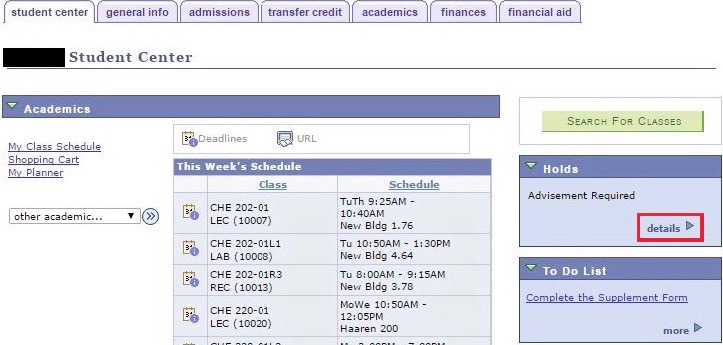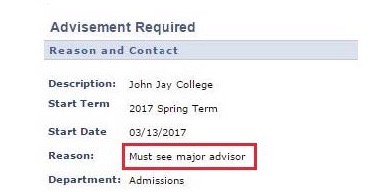Computer Science & Information Security Major Advising Resources
Here you will find:
- Key information about your major
- How and when to meet with your major advisor
- Planning tools that will help you track your progress in the major
- Ways to explore career opportunities related to the CSCI major
Take a few moments to look at the information below. It will help you plan effectively and avoid surprises during your studies at John Jay. Please visit the Department of Mathematics & Computer Science website for information, resources, and opportunities!
CSCI Requirements
You are responsible for the major requirements that were in effect when you declared the major. To confirm the requirements you should be following, go to the Undergraduate Bulletin for that academic year. For example, if you declared the CSCI major in Fall 2015 or Spring 2016, you would click on the 2015-2016 Undergraduate Bulletin. If you declared the major and then left the College for more than one full semester, you’re responsible for the major requirements in effect when you return, if they have changed. Not sure when you declared the major? Find out here.
Below, find the Undergraduate Bulletin that was in effect when you declared the major.
- 2024-2025 Undergraduate Bulletin - CSIS
- 2023-2024 Undergraduate Bulletin - CSIS
- 2022-2023 Undergraduate Bulletin - CSIS
- 2021-2022 Undergraduate Bulletin - CSIS
- 2020-2021 Undergraduate Bulletin - CSIS
- 2019-2020 Undergraduate Bulletin - CSCI
- 2018-2019 Undergraduate Bulletin - CSCI
- 2017-2018 Undergraduate Bulletin - CSCI
- 2016-2017 Undergraduate Bulletin - CSCI
- 2015-2016 Undergraduate Bulletin - CSCI
- 2014-2015 Undergraduate Bulletin - CSCI
- 2013-2014 Undergraduate Bulletin - CIS (PDF)
- 2012-2013 Undergraduate Bulletin - CIS (PDF)
Major Advising
Advising for the Computer Science and Information Security major is available year-round, including summer and winter terms. Any CSCI majors who need advising should send one email that copies (not blind copies) all of the faculty listed below. Do not send a blind copy to all. It will only delay the response or you may not get any response at all. Send an email where everyone is copied in the To or the CC field, and please include your EMPL ID number. Individual faculty emails are shown below, but to simplify things, just copy and paste the following into the To or CC field:
cchurch@jjay.cuny.edu; aahmad@jjay.cuny.edu; kramansenthil@jjay.cuny.edu; sjain@jjay.cuny.edu; hujohnson@jjay.cuny.edu; mobaidat@jjay.cuny.edu; mkhodjaeva@jjay.cuny.edu; jholst@jjay.cuny.edu
|
Advisor |
Email Address |
| Mr. Christopher Church | cchurch@jjay.cuny.edu |
|
Professor Ahmad |
|
|
Professor Ramansenthil |
|
|
Professor Jain |
|
|
Professor Johnson |
|
|
Professor Obaidat |
|
|
Professor Khodjaeva |
|
|
Professor Holst |
Sophomores with 45-59 credits may have a hold on their registration. The hold will be removed when they have an appointment with a major advisor. This discussion will encourage wise planning and allow students to ask any questions they may have about the major. How do you know if you have a major hold? Go to CUNYfirst and complete the following steps:
- Check the Holds box of your CUNYfirst Student Center. If "Advisement Required" appears, click on “details.”

- Click on “Advisement Required.”

- See which type of advisement you need. If you must see a major advisor, then make a major advising appointment following the steps preferred by this department.

Plan Ahead: Graduate on Time
The CSCI major has several courses that build on each other in a sequence, so it is important to consult with a CSCI major advisor to make sure you know which CSCI courses to take next and which combinations of major courses make sense. Keep the following guidelines in mind:
- The CSCI major requires that students take MAT 105 or 141 or higher to begin any courses in the major, so establish this math foundation in your first semester at John Jay. The major also requires you to take calculus (MAT 241). NOTE: As of fall 2021, MAT 151 replaces MAT 241.
- Take CSCI 271 and then CSCI 272 as soon as possible, since CSCI 272 is a prerequisite for most courses in the major.
- CSCI 400 is a hard prerequisite for CSCI 401. Failing to plan for this sequence will delay graduation.
- Transfer students who have general CSCI credit (but not transfer courses specifically equivalent to CSCI major courses) should consult with a CSCI major advisor as soon as possible after their credits are evaluated to see if those credits may be used towards the major.
- Be sure to make use of course planning resources. The Sample Four Year Plan provides a guideline for one way to complete all degree requirements with this major. Additionally, given the highly sequenced nature of the CSCI major, students should consult this Course Flow Chart when planning future semesters.
- Remember that you will need at least a 2.0 GPA in the major and at least a 2.0 overall GPA to graduate.
- DegreeWorks degree audit - Use this online planning tool to track your overall progress toward graduation. You will see which of your general education and major requirements are completed, in progress, or still needed. Refer to the DegreeWorks FAQs to better understand how to use this helpful tool. Note: be sure to confirm the accuracy of your degree audit with a general advisor and major advisor.
- Computer Science and Information Security Major Checklist - Fill out this printable worksheet to keep track of which major requirements you have completed and which ones you still need.
- Sample Four Year Plan - See an example of how you could complete all your degree requirements (major, general education, electives) and graduate in four years! Remember that this sample plan shows just one possible way to combine your requirements. Transfer students in particular should work with advisors to determine a plan that works best for them. All CSCI majors should consult this Course Flow Chart while planning future semesters so they are aware of course sequences.
A General Academic Advisor will confirm what general academic requirements you still need, make suggestions about smart course planning that will help you graduate without delays, discuss your interest in adding a minor or second major, inform you about opportunities such as study abroad, discuss general questions and concerns, and make helpful referrals. Visit the Academic Advisement Center's webpage for more information.
CSCI and Careers
Although becoming a computer scientist requires long and expensive graduate training and a fierce struggle for a handful of academic jobs, many of our graduates have found the Computer Science and Information Security BS to be an excellent pathway to the Accelerated Dual Degree Program in Computer Science and Information Security and Digital Forensics and Cybersecurity as well as graduate programs in Computer Science, including the PhD Program in Computer Science at the CUNY Graduate Center, where many of our computer science faculty hold an appointment. Professor Shweta Jain (sjain@jjay.cuny.edu), interim director of our D4CS program and Doctoral faculty at the CUNY Graduate Center, is happy to offer advice, perspective, and help with applications to the graduate programs.
Listen to Professors Matluba Kodjaeva and Kumar Ramansenthil talk about how the Computer Science and Information Security major focuses on deep technical aspects of cybersecurity, helps you evaluate cybercrime risks, and prepares you to apply math and science in a range of exciting high demand jobs, particularly those dedicated to computer security and cyber investigation.
The Computer Science and Information Security Major can provide a strong foundation for a range of careers, including the following:
- security analyst
- malware analyst
- vulnerability handler
- software engineer / programmer
- security engineer
- system administrator
- security architect
- computer forensic analyst
- reverse engineer
The Center for Career and Professional Development is a great resource for all questions related to job searches, internships, and career preparation. CCPD staff are available to meet individually with students and alumni in L72.00 New Building. To request a 45-minute counseling appointment, log on to John Jay Careers Online. 15-minute drop-in sessions are available all day Mon-Fri. Stop by in person earlier the same day to schedule a drop-in session.